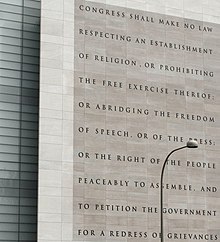
Back حرية التعبير في الولايات المتحدة الأمريكية Arabic Liberté d'expression aux États-Unis French Ƴancin Faɗar Albarkacin Baki a Amurka Hausa په متحده ايالتونو کې د بيان ازادي Pashto/Pushto

In the United States, freedom of speech and expression is strongly protected from government restrictions by the First Amendment to the U.S. Constitution, many state constitutions, and state and federal laws. Freedom of speech, also called free speech, means the free and public expression of opinions without censorship, interference and restraint by the government [1][2][3][4] The term "freedom of speech" embedded in the First Amendment encompasses the decision what to say as well as what not to say.[5] The Supreme Court of the United States has recognized several categories of speech that are given lesser or no protection by the First Amendment and has recognized that governments may enact reasonable time, place, or manner restrictions on speech. The First Amendment's constitutional right of free speech, which is applicable to state and local governments under the incorporation doctrine,[6] prevents only government restrictions on speech, not restrictions imposed by private individuals or businesses unless they are acting on behalf of the government.[7] The right of free speech can, however, be lawfully restricted by time, place and manner in limited circumstances. Some laws may restrict the ability of private businesses and individuals from restricting the speech of others, such as employment laws that restrict employers' ability to prevent employees from disclosing their salary to coworkers or attempting to organize a labor union.[8]
The First Amendment's freedom of speech right not only proscribes most government restrictions on the content of speech and ability to speak, but also protects the right to receive information,[9] prohibits most government restrictions or burdens that discriminate between speakers,[10] restricts the tort liability of individuals for certain speech,[11] and prevents the government from requiring individuals and corporations to speak or finance certain types of speech with which they do not agree.[12][13][14]
Categories of speech that are given lesser or no protection by the First Amendment include obscenity (as determined by the Miller test), fraud, child pornography, speech integral to illegal conduct,[15] speech that incites imminent lawless action, and regulation of commercial speech such as advertising.[16][17] Within these limited areas, other limitations on free speech balance rights to free speech and other rights, such as rights for authors over their works (copyright), protection from imminent or potential violence against particular persons, restrictions on the use of untruths to harm others (slander and libel), and communications while a person is in prison. When a speech restriction is challenged in court, it is presumed invalid and the government bears the burden of convincing the court that the restriction is constitutional.[18]
- ^ "freedom of speech In: The American Heritage® Dictionary of the English Language, Fifth Edition, 2020". Houghton Mifflin Harcourt Publishing Company. Archived from the original on July 28, 2020. Retrieved July 28, 2020.
- ^ "freedom of speech". Merriam-Webster. Archived from the original on February 29, 2020. Retrieved July 28, 2020.
- ^ "free speech". Cambridge Advanced Learner's Dictionary. Archived from the original on September 16, 2019. Retrieved July 28, 2020.
- ^ "freedom of speech". Dictionary.com. Archived from the original on June 16, 2019. Retrieved July 28, 2020.
- ^ "Riley v. National Federation of the Blind, 487 U.S. 781 (1988), at 796 - 797". Justia US Supreme Court Center. Retrieved July 28, 2020.
- ^ Sorrell v. IMS Health, Inc., 131 S. Ct. 2653, 2661 (Supreme Court of the United States 2011).
- ^ Dunn, Christopher (April 28, 2009). "Column: Applying the Constitution to Private Actors (New York Law Journal)". New York Civil Liberties Union. Retrieved January 27, 2017.
- ^ Berman-Gorvine, Martin (May 19, 2014). "Employer Ability to Silence Employee Speech Narrowing in Private Sector, Attorneys Say". Bloomberg BNA. Retrieved March 1, 2019.
- ^ Mart, Susan (2003). "The Right to Receive Information". Law Library Journal. 95 (2): 175–189. Retrieved December 9, 2021.
- ^ Citizens United v. Federal Election Com'n, 130 S. Ct. 876, 896-897 (Supreme Court of the United States 2010).
- ^ Snyder v. Phelps, 131 S. Ct. 1207 (Supreme Court of the United States 2011).
- ^ Keighley, Jennifer (2012). "Can You Handle the Truth? Compelled Commercial Speech and the First Amendment". Journal of Constitutional Law. 15 (2): 544–550. Retrieved January 27, 2017.
- ^ Abood v. Detroit Board of Education, 431 U.S. 209 (Supreme Court of the United States 1977).
- ^ Riley v. National Federation of Blind of NC, Inc., 487 U.S. 781 (Supreme Court of the United States 1988).
- ^ Volokh, Eugene (2016). "The 'Speech Integral to Criminal Conduct' Exception" (PDF). Cornell Law Review. 101: 981. Retrieved August 6, 2017.
- ^ United States v. Alvarez, 132 S. Ct. 2537 (Supreme Court of the United States 2012).
- ^ Sorrell v. IMS Health, Inc., 131 S. Ct. 2653 (Supreme Court of the United States 2011).
- ^ Ashcroft v. American Civil Liberties Union, 542 U.S. 656, 660 (Supreme Court of the United States 2004).
